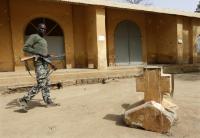Mali's Bishops Say Situation Has Reached 'tragic Proportions'
OXFORD, England (CNS) -- Mali's Catholic bishops praised efforts by their acting head of state to hold the country together and backed his appeal for a "general mobilization" against Islamist insurgents.
"The situation we are living through is very grave and has reached tragic proportions in recent days," the bishops' conference said in a Jan. 24 letter to President Dioncounda Traore.
"Through you, as supreme head of our armies, we salute Mali's armed and security forces in their common efforts to liberate our country," said the letter. "We are aware of the appeals you have made, and we endorse them, body and soul."
The letter was published during the bishops' Jan. 21-25 plenary in the capital, Bamako. The meeting coincided with the recapture of rebel-held towns by French-backed Malian forces.
The bishops said the Catholic Church had highlighted the plight of displaced people since the start of the 2012 insurgency, during which ethnic Tuareg rebels seeking a separate state overran northern Mali alongside Islamist fighters from Ansar Edine, which is believed linked to al-Qaida.
They added that they would seek a "mobilization of the Christian community" throughout Lent, which begins Feb. 13, to help secure the country's future.
"We continue to believe a new Mali will emerge from this harsh ordeal, reconciled with itself and its values," the bishops told Traore, who was installed after a March 2012 military coup. "These are the values of faith, fear and respect of God, sincere fraternity between its different components, love of homeland and a sense of sacrifice."
The 200,000-member Catholic Church has six dioceses and makes up around 1.3 percent of Mali's population of 15.5 million, nine-tenths of whom are Muslim and concentrated in the south. France intervened Jan. 11 to prevent insurgents from seizing more of the country after imposing strict Shariah law in northern towns and villages.
Malian troops, backed by French regulars, recaptured the central towns of Diabaly and Douentza, around 250 miles north of Bamako, in late January, while French air strikes were reported Jan. 25 near rebel-held Gao.
However, human rights groups expressed concern after reports of atrocities against Arabs and Tuaregs by victorious Malian soldiers, who are set to be joined by 5,000 troops from neighboring African states.
In a Jan. 25 interview with Catholic News Service from Bamako, the regional information officer of the U.S. bishops' Catholic Relief Services, Helen Blakesley, said aid agencies were worried about potential ethnic clashes as more towns were reoccupied.
She added that they had welcomed a Jan. 18 appeal by Archbishop Jean Zerbo of Bamako for "humanitarian corridors" and said CRS was expecting a new influx of refugees to the capital from conflict-torn central areas.
"There's still nervousness and tension in Bamako, and the humanitarian time-bomb is ticking," Blakesley said. "Although there's some sense of reassurance now, and Malian and French flags are flying in the streets, no one knows which way the fighting will go."
In an interview with the Rome-based Fides news agency, the bishops' conference secretary-general, Father Edmond Dembele, said the bishops had visited injured soldiers and civilians in Bamako's main hospital during their plenary and received a report on humanitarian needs from a Caritas representative.
Meanwhile, in a Jan. 24 pastoral letter to Catholics, the bishops said they believed Mali's year-old crisis had now entered its "crucial phase," and they invited Catholics "to prayer, solidarity, unity and vigilance."
"We especially appeal for solidarity toward those of our compatriots directly touched by the conflict -- the displaced and refugees, the families in mourning, the armed and security forces," the bishops said in the letter. "The bishops' conference has decided to launch a national mobilization for the start of Lent to collect financial and material resources to aid the conflict's victims."
Speaking Jan. 25 on Malian TV, the bishops' conference president, Bishop Jean-Baptiste Tiama of Sikasso, said church leaders had asked to meet Traore to "extend sympathy and compassion" and to discuss the civic qualities most needed for the country's future.
"We assured him of our prayers for the dead, the wounded and their families," Bishop Tiama said.


